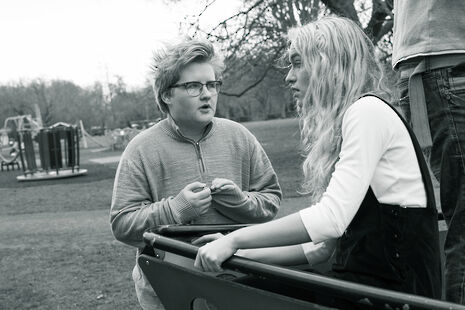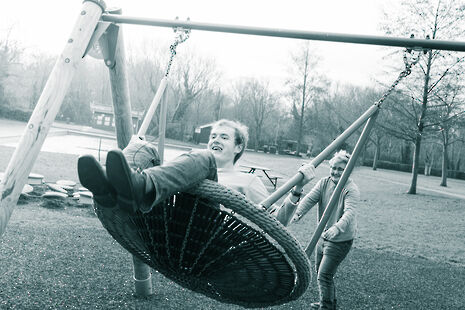Review: Blue Remembered Hills
Galaxy Henry is plunged into the depths of childhood imagination in this production of Blue Remembered Hills, but feels that it doesn’t quite reach its potential

"It can be a fort when it’s not a house!" yells Angela (Eleanor Burke), a pig-tailed and pouty-lipped young madam, whose struggle for existence in war-torn Britain is visible within the dialogue of her childish games. Whether out of naivety or an attempt to seek refuge in ignorance, Angela and her seven-year-old playmates fail to comprehend that once violence enters a place of peace, it takes more than facile negotiation to exorcise its demons. Blue Remembered Hills follows an unforgettable day in the lives of seven children as they venture so far away from childish innocence, that not even the trail of debris they leave behind can lead them safely back home.
Zoe Barnes’s take on the play uses character development and interaction to document the destruction of childhood as it collides with the brutal reality of the adult world. But Barnes adds a depth to her creation with the aid of audio and visual effects, evident from the play's opening as the nostalgic atmosphere of the mise-en-scène with its haunting wartime music and wreaths of brown paper planes strewn limply across the gnarled branches of trees, is suddenly disrupted by the jarring sound of a bomber plane in the skies above. Later, the howling of a klaxon also disrupts the children at play and, as the beast of war rages against the children’s freedom, the audience mourn the loss of their innocence.
"Audience members were whisked away from the windy streets of Cambridge, and into deepest darkest heart of West Country woodland"
Before long, the extent to which the children’s lives are laced with the idiom of war becomes clear. For the character of Peter (Max Harrison) this is illustrated by his threatening displays of aggression. The swiftness with which his demeanour switches from intimidating to playful is at once disconcerting and impressive. The animosity he directs towards his peers is uncharacteristic of a typical child, and is therefore rather unsettling. This, combined with his unpredictable temperament, and the skill with which this is conveyed through dialogue and movement, contributes to the undercurrent of fear within the play, which seems to drive the actions of the characters.

Although the roles of children are deliberately given to adults, the generation divide soon becomes blurred as all members of the cast fully embody the spirit of their adopted personas, and this makes for fascinating theatre. However, what it most striking is the way in which space is used to maximise the spectator’s viewing experience. First seen with Willie’s (Elise Hagan) mesmerising off-stage entrance, whereby he explodes onto the stage in a burst of youthful innocence and glee, the whole theatre, stalls and all, becomes the children’s playground.
Nevertheless, the fun cannot last forever and as the narrative progresses, the children’s games take a sinister turn for the worse. What was once a game of ‘tag’ becomes a wild chase to recapture an increasingly intangible youth. Meanwhile, when Donald (Andrew Carey) no longer has the strength to chase after his absent father, we watch in horror as he uses more extreme methods to extinguish his pain.
Blue Remembered Hills tests the both limits of infantile imagination, and exposes its inability to remain impermeable when plunged into a reality as toxic as the rolling waves of mustard-gas which would send soldiers to their graves. Whilst, on opening night, the ending did not reach its full potential, as far as dramatic impact is concerned, thanks to the excellent performances of the cast, and their valiant efforts to maintain the Forest Dean dialect, audience members were whisked away from the windy streets of Cambridge, and into deepest darkest heart of West Country woodland
 News / Uni members slam ‘totalitarian’ recommendation to stop vet course 15 January 2026
News / Uni members slam ‘totalitarian’ recommendation to stop vet course 15 January 2026 Science / Why smart students keep failing to quit smoking15 January 2026
Science / Why smart students keep failing to quit smoking15 January 2026 Comment / Will the town and gown divide ever truly be resolved?12 January 2026
Comment / Will the town and gown divide ever truly be resolved?12 January 2026 Interviews / The Cambridge Cupid: what’s the secret to a great date?14 January 2026
Interviews / The Cambridge Cupid: what’s the secret to a great date?14 January 2026 Features / How sweet is the en-suite deal?13 January 2026
Features / How sweet is the en-suite deal?13 January 2026









